-
🚚
Free Ship > $60
Same or Next Day
-
🔐
Secure Payments
-
📬
30 Day Returns
Satisfaction Guaranteed
-
🟢
Inventory In-Sync
No Drop Shipping
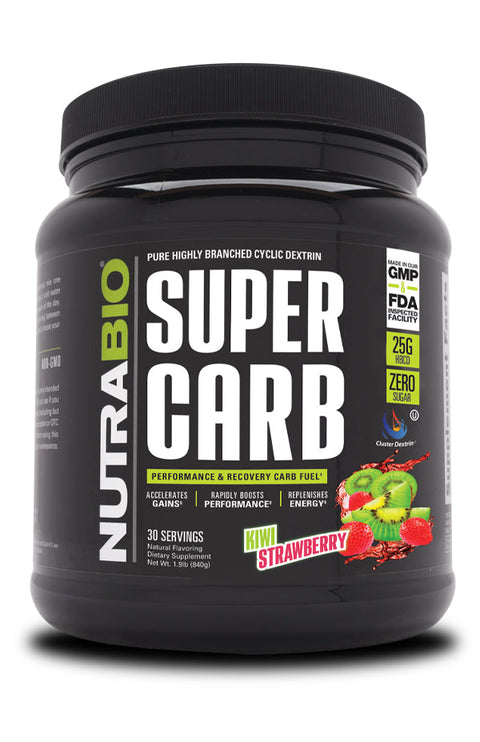
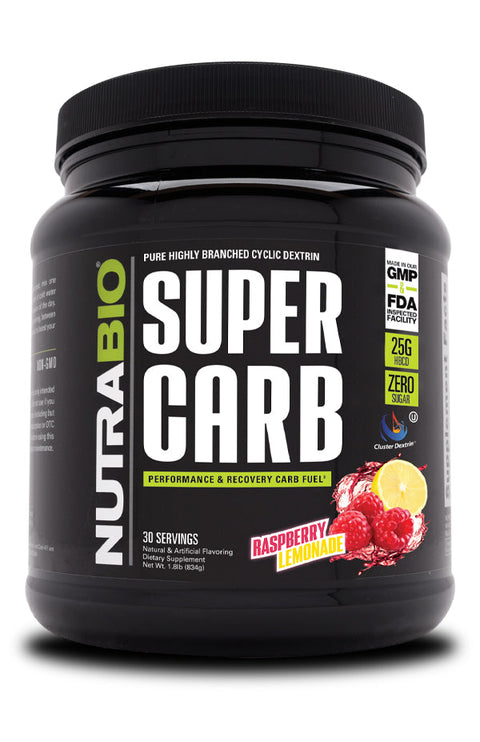
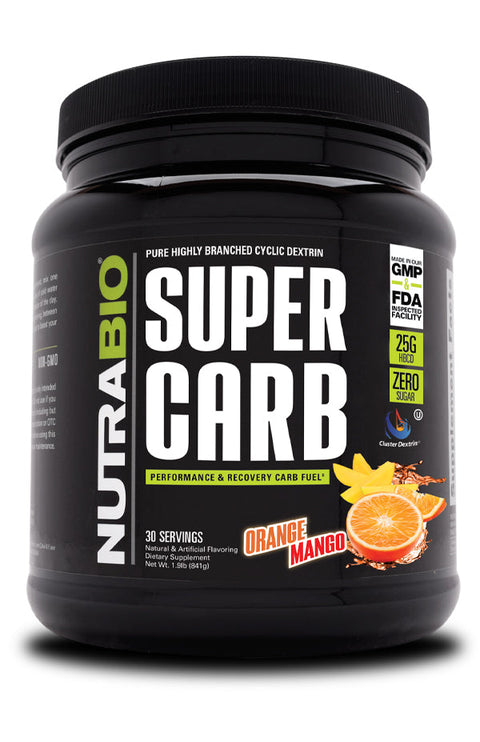
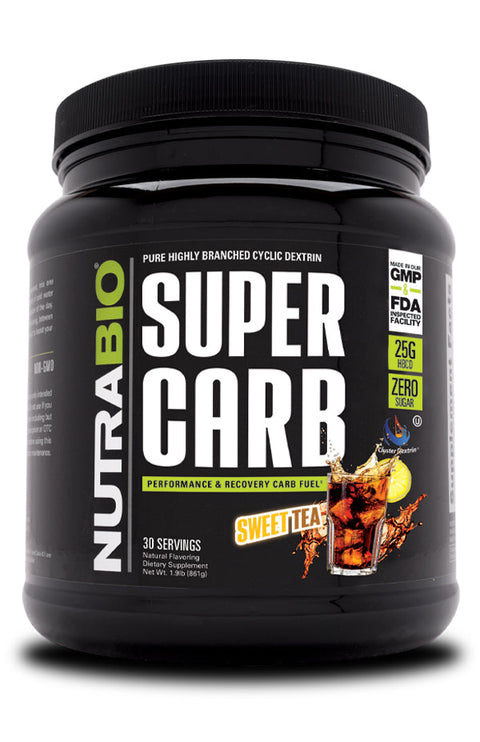
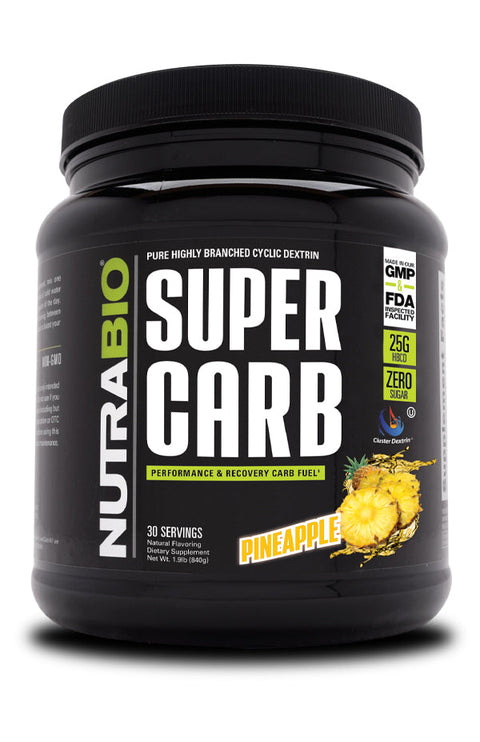
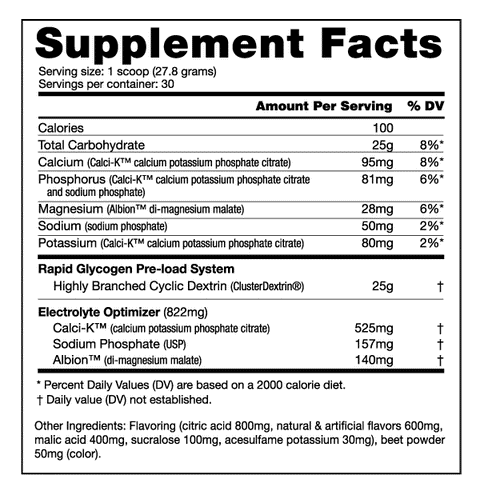
NutraBio Super Carb
Product Description
HOW DOES IT WORK?
- Rapidly fuels performance with no stomach discomfort.
- Replenishes glycogen stores for accelerated recovery.
- 100% Highly Branched Cyclic Dextrin.
- Advanced electrolyte performance matrix.
- Zero fillers, maltodextrin, dextrose, or additives.
- No proprietary blends and full label disclosure.
NutraBio SuperCarb: A Superior Carbohydrate for Superior Performance
NutraBio SuperCarb is an innovative product designed to fuel performance through the use of the patented carbohydrate Cluster Dextrin®. Unlike typical carbs such as dextrose or fructose, Cluster Dextrin® is a low glycemic, highly branched cyclic dextrin (HBCD) with a high molecular weight and ultra-low osmolality. These properties of HBCD make it highly soluble and promote fast gastric emptying, virtually eliminating the gastric distress often associated with less advanced carbohydrates. Cluster Dextrin® also maintains a slow release, offering the ideal interaction between carbohydrate breakdown and the normal release of free fatty acids. The result is a superior carbohydrate that delivers smooth, constant energy and replenishes muscle glycogen stores without spiking blood sugar levels.
By itself, SuperCarb is an ideal fuel source and a better alternative to sugar-laden sports beverages that can cause bloating, sloshing, sugar crashes, and other stomach-related issues. Furthermore, SuperCarb includes a cleverly crafted electrolyte blend designed using Albion Lab's premier mineral complexes as electrolyte donors. These help ensure efficient muscle contractions while eliminating the potential for cramping due to dehydration from training hard. SuperCarb (available unflavored) can also be added to any pre-, intra-, or post-workout product when sustained energy is needed for long, intense workouts or to help restore depleted muscle glycogen.
From the information presented above, it is easy to see why the Cluster Dextrin® found in SuperCarb is the most advanced super carb available and is far superior to lower quality carbohydrate sources. No other carbohydrate can rival its effectiveness and ergogenic properties.
Where Clinical Research Eclipses the Hype
Compared to other carbohydrate sources, Cluster Dextrin® is research proven to enhance endurance performance, promote fast gastric emptying times, and lower markers for stress hormones after exhaustive exercise. No other carbohydrate source can demonstrate clinical data like this.
- In a 2013 human clinical trial of Cluster Dextrin®, 24 adult male athletes showed that during cycling exercise, the group administered 15 grams of Cluster Dextrin performed better than those who took the same amount of a maltodextrin.
- An additional research study conducted in 2015 found that swimmers who supplemented with HBCD before doing intervals at 75–90% VO2 max were able to improve time to exhaustion by 70% compared to when they supplemented with either water or glucose.
- Hiroshi et al. (2004) discovered that subjects who consumed a sports drink based on 10% HBCD during bicycle exercise experienced fewer gastrointestinal disorders and consequently could continue the exercise comfortably with little fatigue compared to the groups who consumed a glucose-based sports drink.
- Lastly, a 2014 study conducted by Suzuki et al. found that triathletes who consumed HBCD before a race had a reduced stress hormone response and lower urinary cytokine levels compared to when they supplemented with glucose. This suggests that HBCD lowers the inflammatory response of exercise, which in turn increases performance and decreases time spent recovering.
Carbohydrate Recommendations for Strength and Endurance Athletes
Due to the unique energy demands of strength and endurance-based sports, athletes who participate in these activities have different carbohydrate requirements for fueling optimal performance. Aerobic endurance athletes and those who train for 60 minutes or more a day (think runners, cyclists, MMA fighters) should strive to consume 8–10 grams of carbohydrate per kilogram of body weight daily to replenish glycogen levels. On the other hand, athletes who do not train aerobically for more than an hour each day (weight training, sprinting, football) should strive for 5–6 grams of carbohydrate per kilogram body weight daily.
Directions
When and how many carbohydrates should I consume before, during, and after exercise?
The following table outlines general recommendations for carbohydrate consumption before, during, and after exercise. However, athletes may need to experiment with different protocols (timing, types, and amounts) to produce individual optimal performance.
General Carbohydrate Intake |
|
Carbohydrate 3–4 Hours Before Exercise |
|
Carbohydrate 30–60 Minutes Before Exercise |
|
Carbohydrate Immediately Before Exercise |
|
Carbohydrate During Exercise |
|
Carbohydrate After Exercise |
|
*Table Courtesy of Sports Nutrition & Performance Enhancing Supplements Textbook (Smith-Ryan & Antonio, 2013)
Carbohydrates Are Not Bad For You
Carbohydrates have been cast in a negative light the past few years with so-called experts stating they cause weight gain, excess body fat, adverse blood lipid profiles, and a host of other problems that can wreak havoc on your health—all of which are simply not true. However, what these experts fail to tell you is that carbohydrates are the preferred source of fuel during high-intensity, anaerobic exercise such as sprinting or weight lifting. Consuming adequate carbohydrates, which are broken down into glucose in the bloodstream or stored in muscle tissue as glycogen, ensures you have the stamina to power through workouts without hitting a wall. In fact, various professional fitness organizations recommend 50–60% of total daily calories should come from carbohydrates to produce optimal performance in athletes.
On the other hand, low carbohydrate consumption can cause the body to use protein as energy, which in turn affects the ability of muscles to repair and recover. Simply put, carbohydrates are king when it comes to exercise performance. It should be noted, though, that not all carbohydrates are created equal. This is why NutraBio formulated SuperCarb using the patented advanced carbohydrate Cluster Dextrin®.
The Bottom Line on Carbohydrates and Why SuperCarb Should Be Included in Any Performance-Enhancing Stack
It is hard to argue that carbohydrates are not the most valuable macronutrient that fuels performance. While most research on the benefits of adequate carbohydrate consumption has been performed in endurance sports, there is an emerging body of evidence that carbohydrates play a vital role in sports such as weightlifting, football, and soccer. Without a doubt, carbohydrate is the most important energy-yielding nutrient for optimizing performance in most sports with a greater work output. Furthermore, lack of dietary carbohydrate has been linked to performance limitations in these sports. According to Smith-Ryan and Antonio (2013), "Strategic carbohydrate consumption before, during, and after exercise training should be a foremost concern for athletes to maximize muscle glycogen levels before the onset of exercise, as well to provide energy to muscle during exercise and hasten recovery of glycogen after exercise is complete."
NutraBio SuperCarb can help athletes from all sports meet their individual daily carbohydrate requirements, provide energy before and during workouts, and replenish muscle glycogen stores post-workout.
FAQs:
Q: What is the best way to take SuperCarb?
- Based on performance needs, mix 1 to 2 scoops of SuperCarb into 12–16 ounces of water. Shake well for 30–45 seconds. Consume before, during, or after intense exercise as needed for extra energy. Increase dosage if engaging in prolonged exertion for 2 hours or more.
Q: I see SuperCarb has ultra-low osmolality. What does this mean?
- Osmolality, in this case, refers to how fast a liquid will move through the stomach. This property of SuperCarb allows for quick digestion and absorption where it can provide instant energy.
Q: What makes the Cluster Dextrin used in SuperCarb superior to more commonly used carbohydrates, such as fructose or dextrose?
- Cluster Dextrin has a low glycemic index, so it will not spike and crash blood sugar levels compared to other carbohydrates such as fructose and dextrose. Additionally, these less advanced carbohydrates have slower gastric emptying times, which can cause GI distress, sloshing, and other stomach-related issues.
Q: What other NutraBio products do you recommend stacking with SuperCarb?
- While SuperCarb makes a great stand-alone product, it can be stacked with any NutraBio Pre and Intra workout product for sustained energy during long workouts. SuperCarb can also be taken with any NutraBio protein, such as our Whey Protein Isolate, for enhanced glycogen replenishment.







